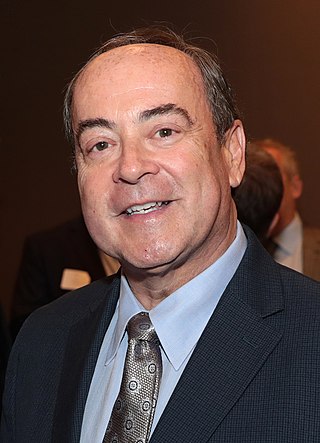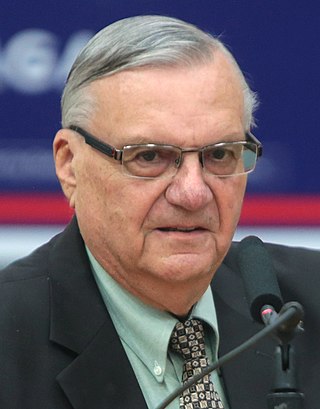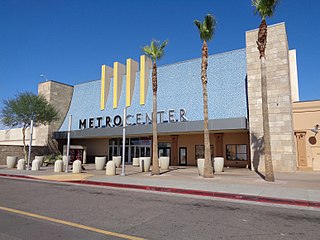Related Research Articles
The Baltimore Development Corporation (BDC) is a nonprofit corporation and public-private agency contracted by the City of Baltimore to promote economic development.

Clint Bolick is a justice of the Arizona Supreme Court. Previously, he served as Vice President of Litigation at the conservative/libertarian Goldwater Institute. He co-founded the libertarian Institute for Justice, where he was the Vice President and Director of Litigation from 1991 until 2004. He led two cases that went before the Supreme Court of the United States. He has also defended state-based school choice programs in the Supreme Courts of Wisconsin and Ohio.

Tax increment financing (TIF) is a public financing method that is used as a subsidy for redevelopment, infrastructure, and other community-improvement projects in many countries, including the United States. The original intent of a TIF program is to stimulate private investment in a blighted area that has been designated to be in need of economic revitalization. Similar or related value capture strategies are used around the world.

The Goldwater Institute is a conservative and libertarian public policy think tank located in Phoenix whose stated mission is "to defend and strengthen the freedom guaranteed to all Americans in the constitutions of the United States and all fifty states". The organization was established in 1988 with the support of former Senator Barry Goldwater.

Phil Gordon is an American politician who served as the 58th mayor of Phoenix, Arizona from 2004 to 2012 and a member of the Phoenix City Council. Gordon is a member of the Democratic Party.

Joseph Michael Arpaio is an American former law enforcement officer and politician. He served as the 36th Sheriff of Maricopa County, Arizona for 24 years, from 1993 to 2017, losing reelection to Democrat Paul Penzone in 2016.
Fiesta Mall is a former shopping mall in Mesa, Arizona, United States. Opened in 1979 after nine years of development, it was built by Homart Development Company, the former shopping mall development division of the department store Sears. Sears was the first anchor store to open in the mall, doing so in 1977. Also present as anchor stores were The Broadway and Goldwater's, with Diamond's following in 1980. The mall began experiencing declines in traffic following the opening of Arizona Mills in 1997, and saw numerous anchor store and inline tenancy changes. After a long period of decline, it was shuttered in January 2018.

Los Arcos Mall was an enclosed shopping mall on the southeast corner of Scottsdale and McDowell roads in Scottsdale, Arizona. The mall, which operated from 1969 to 1999, featured a Spanish architectural motif and took its name from "The Arches" in Spanish. In the 1990s, the mall lost shoppers and both of its anchors, particularly to the Scottsdale Fashion Square center, which was closer to population growth in the city. The last anchor, Sears, left Los Arcos for Fashion Square in February 1999.
The Domain is a high-density office, retail, and residential center in northwest Austin, Texas, United States that has been described as being "Austin's second downtown" and that primarily consists of 5-over-1 construction. The initial phase of the project was completed in March 2007.

Metrocenter was a regional enclosed shopping mall in northwest Phoenix, Arizona. It was bounded by Interstate 17, 31st, Dunlap and Peoria Avenues. Before its closure, the three most recently open anchor stores were Harkins Theatres, Walmart Supercenter, and Dillard's Clearance Center; three additional vacant anchor stores included former Sears, JCPenney, and Macy's locations. The mall featured 100 stores, a 12 screen movie theater, and a food court. Since January 2021, the mall had been owned by the Carlyle Development Group based in New York City. The mall officially closed on June 30, 2020.
The metropolitan area of Phoenix in the U.S. state of Arizona contains one of the nation's largest and fastest-growing freeway systems, with over 1,405 lane miles (2,261 km) as of 2005.

Arizona is a state in the Southwestern United States. It is the 6th-largest and the 14th-most-populous of the 50 states. Its capital and largest city is Phoenix. Arizona is part of the Four Corners region with Utah to the north, Colorado to the northeast, and New Mexico to the east; its other neighboring states are Nevada to the northwest, California to the west and the Mexican states of Sonora and Baja California to the south and southwest.

The history of Phoenix, Arizona, goes back millennia, beginning with nomadic paleo-Indians who existed in the Americas in general, and the Salt River Valley in particular, about 7,000 BC until about 6,000 BC. Mammoths were the primary prey of hunters. As that prey moved eastward, they followed, vacating the area. Other nomadic tribes moved into the area, mostly from Mexico to the south and California to the west. Around approximately 1,000 BC, the nomadic began to be accompanied by two other types of cultures, commonly called the farmers and the villagers, prompted by the introduction of maize into their culture. Out of these archaic Indians, the Hohokam civilization arose. The Hohokam first settled the area around 1 AD, and in about 500 years, they had begun to establish the canal system which enabled agriculture to flourish in the area. They suddenly disappeared by 1450, for unknown reasons. By the time the first Europeans arrived at the beginning of the 16th century, the two main groups of native Indians who inhabited the area were the O'odham and Sobaipuri tribes.
The Maricopa County Sheriff's Office (MCSO) is a law enforcement agency in Maricopa County, Arizona that was involved in a number of controversies. It is the largest sheriff's office in the state of Arizona and provides general and specialized law enforcement to unincorporated areas of Maricopa County, serving as the primary law enforcement for unincorporated areas of the county as well as incorporated cities within the county which have contracted with the agency for law-enforcement services. It also operates the county jail system. Elected in 2016, Paul Penzone is the current sheriff of Maricopa County. Penzone replaced Joe Arpaio after his 24-year tenure as sheriff.

The Phoenix Coyotes, a professional ice hockey team now known as the Arizona Coyotes and playing in the National Hockey League (NHL), filed for bankruptcy in 2009 after incurring several hundred million dollars of losses since their move to Phoenix, Arizona from Winnipeg, Manitoba, where they were known as the Winnipeg Jets. Bankruptcy court rejected a plan to sell the team and move it to Canada, and the team was purchased by the NHL. The NHL operated the team in Phoenix for four seasons while seeking a new owner. After several prospective purchases fell through, the team was finally sold in the summer of 2013.

Government incentives for plug-in electric vehicles have been established around the world to support policy-driven adoption of plug-in electric vehicles. These incentives mainly take the form of purchase rebates, tax exemptions and tax credits, and additional perks that range from access to bus lanes to waivers on fees. The amount of the financial incentives may depend on vehicle battery size or all-electric range. Often hybrid electric vehicles are included. Some countries extend the benefits to fuel cell vehicles, and electric vehicle conversions.

The mayoral election for Phoenix, Arizona, United States, in 2011 was held in a two-round system on August 30, 2011, and November 8, 2011. Greg Stanton, a former city councilman, was elected over Wes Gullett, and took office on January 3, 2012, succeeding Phil Gordon, who held the office of Mayor of Phoenix from 2004 to 2012. The election coincided with the Phoenix City Council elections to the four odd-numbered districts.
The following is a timeline of the history of the city of Phoenix, Arizona, United States.

Harper Court is a mixed-use commercial development in the Hyde Park community area on the South Side of Chicago, Illinois, United States, that includes a Hyatt Hotel and a 12-storey office tower that is leased and occupied by the University of Chicago. Although the hotel opened on September 17, 2013, the commercial structure, which also has extensive retail and parking space, officially opened on November 8, 2013. The University of Chicago exercised its option to purchase most of the development on November 13 and then put most of what it acquired up for sale in March 2014. The University provided much of the financing and retains a master lease over the retail tenants. The development was acquired by Clal Insurance Company in July 2014.
Leapfrog development occurs when developers skip over land to obtain cheaper land further away from cities, thus, leaving huge areas empty between the city and the new development. It can be seen when it comes to the development or urbanization of more rural areas.
References
- ↑ www.bizjournals.com https://www.bizjournals.com/phoenix/stories/2006/05/08/story6.html . Retrieved 2021-02-18.
{{cite web}}: Missing or empty|title=(help) - ↑ "Construction begins on City North in northeast Phoenix area". yourvalley.net. 25 June 2019. Retrieved 17 September 2019.
- ↑ www.bizjournals.com https://www.bizjournals.com/phoenix/news/2020/02/14/developers-aim-for-city-in-the-city-at-desert.html . Retrieved 2021-02-18.
{{cite web}}: Missing or empty|title=(help) - 1 2 Clancy, Michael (July 2, 2010). "CityNorth's High Street taken over by original lenders". The Arizona Republic . Retrieved 2020-07-21.
{{cite web}}: CS1 maint: url-status (link) - 1 2 Gordon, Phil and Peggy Neely. "CityNorth project a big win for Phoenix”, The Arizona Republic , April 7, 2008.
- ↑ Fairbanks, Frank (July 26, 2009). "Hobbled for the future". The Arizona Republic . Retrieved 2020-07-21.
{{cite web}}: CS1 maint: url-status (link) - 1 2 3 4 Wells, Dave. "CityNorth Retail Economic Analysis" Archived 2012-04-14 at the Wayback Machine October 30, 2007
- ↑ Pavlov, Andrey. "Review of CityNorth Project" Archived 2012-04-14 at the Wayback Machine October 30, 2007
- 1 2 3 Miles, Judge Robert. "Turken v. Gordon Ruling" Archived 2012-04-14 at the Wayback Machine . Superior Court of Arizona, Maricopa County. April 2, 2008.
- ↑ "Goldwater Institute Will Promptly Appeal CityNorth Subsidy Ruling" Goldwater Institute , April 2, 2008
- ↑ Buccholtz, Jan. "CityNorth developer, city of Phoenix sue Goldwater Institute for legal fees", The Business Journal of Phoenix, April 23, 2008.
- ↑ “Developer and City of Phoenix File Claims for Attorneys’ Fees”, April 22, 2008.
- ↑ “Developer Petition for Attorneys’ Fees” [ permanent dead link ], Superior Court of Arizona, Maricopa County, No. CV2007-013766, April 22, 2008.
- ↑ “City of Phoenix Petition for Attorneys’ Fees” [ permanent dead link ], Superior Court of Arizona, Maricopa County, No. CV2007-013766, April 22, 2008.
- 1 2 3 Buccholtz, Jan. "CityNorth developer, city of Phoenix sue Goldwater Institute for legal fees", The Business Journal of Phoenix, April 23, 2008
- 1 2 Bolick, Clint. "The Empire Strikes Back With Massive Attorneys’ Fee Request in CityNorth Case" Archived 2014-10-06 at the Wayback Machine Goldwater Institute, April 24, 2008
- ↑ Clancy, Michael. "Institute hopes to block CityNorth agreement on appeal" The Arizona Republic , April 16, 2008
- 1 2 "CityNorth Incentive Agreement Fact Sheet" (PDF). 0162f72.netsolhost.com. 2011-07-14. Archived (PDF) from the original on 2011-07-14. Retrieved 2020-07-21.
- ↑ Keuth, Don. "CityNorth deal an incentive, not a subsidy" Archived 2011-07-14 at the Wayback Machine , The Tribune, May 20, 2008.
- ↑ Fenske, Sarah."Revolting Development", New Times September 9, 2008.
- ↑ Boyd, Lindsay."Goldwater Institute suit against city of Phoenix Update" Townhall.com, March 5, 2008
- ↑ Ducey, Lynn (Feb 15, 2008). "Bloomingdale's joins CityNorth mix as lawsuit continues over project's tax deals". Phoenix Business Journal. Archived from the original on 2008-02-21. Retrieved 2020-07-21.
- ↑ Will, George F. (2008-03-16). "What taxpayers don't know they're paying for". seattlepi.com. Archived from the original on 2012-10-12. Retrieved 2020-07-21.
- ↑ Clancy, Michael. "Judge hears arguments in CityNorth case", Arizona Republic, February 12, 2008
- 1 2 Schlomach, Byron. "Deal Breaker: A Critique of Phoenix's Subsidy of CityNorth" Goldwater Institute, August 8, 2007
- 1 2 Gibbons, Patrick. "Problematic Parking" Goldwater Institute, March 4, 2008
- ↑ "City of Phoenix Spends $10,000 Per Week on Attorneys to Defend CityNorth Subsidy" Goldwater Institute, January 8, 2008
- ↑ "Arizona's constitution prohibits corporate subsidies" [ permanent dead link ] Goldwater Institute, August 09, 2007
- ↑ Clancy, Michael (Jan 26, 2010). "CityNorth agreement stands for now, but court clarifies position on future cases". The Arizona Republic . Retrieved 2020-07-21.
{{cite web}}: CS1 maint: url-status (link) - ↑ Clancy, Michael. "CityNorth agreement stands for now", The Arizona Republic, January 25, 2010.
- ↑ Clancy, Michael. "CityNorth decision to impact future development deals", The Arizona Republic, February 1, 2010.